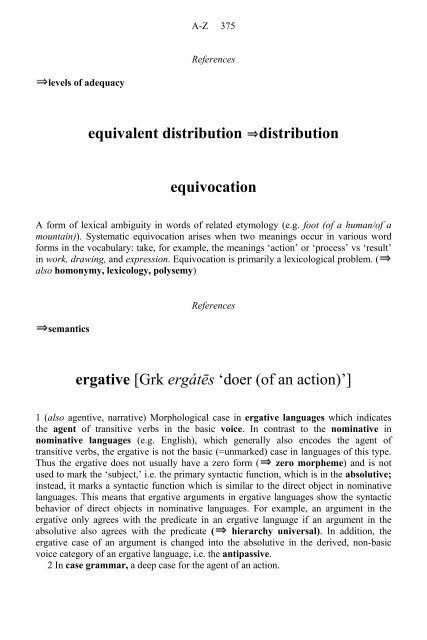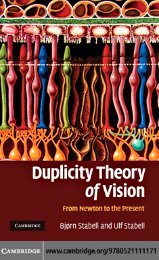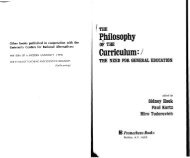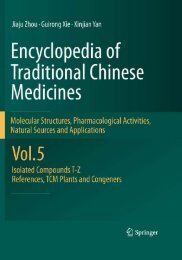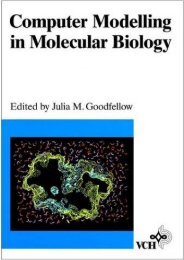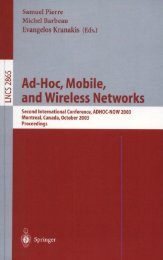Attention! Your ePaper is waiting for publication!
By publishing your document, the content will be optimally indexed by Google via AI and sorted into the right category for over 500 million ePaper readers on YUMPU.
This will ensure high visibility and many readers!

Your ePaper is now published and live on YUMPU!
You can find your publication here:
Share your interactive ePaper on all platforms and on your website with our embed function

Routledge Dictionary of Language and Linguistics.pdf
Routledge Dictionary of Language and Linguistics.pdf
Routledge Dictionary of Language and Linguistics.pdf
You also want an ePaper? Increase the reach of your titles
YUMPU automatically turns print PDFs into web optimized ePapers that Google loves.
A-Z 375Referenceslevels <strong>of</strong> adequacyequivalent distributiondistributionequivocationA form <strong>of</strong> lexical ambiguity in words <strong>of</strong> related etymology (e.g. foot (<strong>of</strong> a human/<strong>of</strong> amountain)). Systematic equivocation arises when two meanings occur in various wordforms in the vocabulary: take, for example, the meanings ‘action’ or ‘process’ vs ‘result’in work, drawing, <strong>and</strong> expression. Equivocation is primarily a lexicological problem. (also homonymy, lexicology, polysemy)semanticsReferencesergative [Grk ergátēs ‘doer (<strong>of</strong> an action)’]1 (also agentive, narrative) Morphological case in ergative languages which indicatesthe agent <strong>of</strong> transitive verbs in the basic voice. In contrast to the nominative innominative languages (e.g. English), which generally also encodes the agent <strong>of</strong>transitive verbs, the ergative is not the basic (=unmarked) case in languages <strong>of</strong> this type.Thus the ergative does not usually have a zero form ( zero morpheme) <strong>and</strong> is notused to mark the ‘subject,’ i.e. the primary syntactic function, which is in the absolutive;instead, it marks a syntactic function which is similar to the direct object in nominativelanguages. This means that ergative arguments in ergative languages show the syntacticbehavior <strong>of</strong> direct objects in nominative languages. For example, an argument in theergative only agrees with the predicate in an ergative language if an argument in theabsolutive also agrees with the predicate ( hierarchy universal). In addition, theergative case <strong>of</strong> an argument is changed into the absolutive in the derived, non-basicvoice category <strong>of</strong> an ergative language, i.e. the antipassive.2 In case grammar, a deep case for the agent <strong>of</strong> an action.
A-Z 375Referenceslevels <strong>of</strong> adequacyequivalent distributiondistributionequivocationA form <strong>of</strong> lexical ambiguity in words <strong>of</strong> related etymology (e.g. foot (<strong>of</strong> a human/<strong>of</strong> amountain)). Systematic equivocation arises when two meanings occur in various wordforms in the vocabulary: take, for example, the meanings ‘action’ or ‘process’ vs ‘result’in work, drawing, <strong>and</strong> expression. Equivocation is primarily a lexicological problem. (also homonymy, lexicology, polysemy)semanticsReferencesergative [Grk ergátēs ‘doer (<strong>of</strong> an action)’]1 (also agentive, narrative) Morphological case in ergative languages which indicatesthe agent <strong>of</strong> transitive verbs in the basic voice. In contrast to the nominative innominative languages (e.g. English), which generally also encodes the agent <strong>of</strong>transitive verbs, the ergative is not the basic (=unmarked) case in languages <strong>of</strong> this type.Thus the ergative does not usually have a zero form ( zero morpheme) <strong>and</strong> is notused to mark the ‘subject,’ i.e. the primary syntactic function, which is in the absolutive;instead, it marks a syntactic function which is similar to the direct object in nominativelanguages. This means that ergative arguments in ergative languages show the syntacticbehavior <strong>of</strong> direct objects in nominative languages. For example, an argument in theergative only agrees with the predicate in an ergative language if an argument in theabsolutive also agrees with the predicate ( hierarchy universal). In addition, theergative case <strong>of</strong> an argument is changed into the absolutive in the derived, non-basicvoice category <strong>of</strong> an ergative language, i.e. the antipassive.2 In case grammar, a deep case for the agent <strong>of</strong> an action.
<strong>Dictionary</strong> <strong>of</strong> language <strong>and</strong> linguistics 376ReferencesAnderson, J.M. 1968. Ergative <strong>and</strong> nominative in English. JL 4. 1–32.——1971. The grammar <strong>of</strong> case: towards a localistic theory. Cambridge.ergative languageergative language (also absolutive language)<strong>Language</strong> type in relational typology which contrasts with nominative languages <strong>and</strong>active languages. Assuming that the most important thematic relations in basictransitive <strong>and</strong> intransitive sentences are those <strong>of</strong> agent <strong>and</strong> patient, ergative languages canbe defined as follows: the basic (=unmarked) case in these languages, the absolutive,designates the patient <strong>of</strong> transitive verbs as well as the single argument <strong>of</strong> intransitiveverbs regardless <strong>of</strong> its thematic relation. The marked case, the ergative serves to expressthe agent <strong>of</strong> transitive verbs. This situation can be depicted as follows:The following sentences from Basque serve as an illustration: Mi-k (‘I’ erg.) gizona(‘man’ abs.) ikusi dut (‘have seen’) ‘I saw the man’ vs Gizona (‘man’ abs.) etorri da (‘hascome’) ‘The man has come.’ The patient <strong>of</strong> transitive verbs <strong>and</strong> the single argument <strong>of</strong>intransitive verbs are treated alike morphologically <strong>and</strong>, in a consistent ergative language,syntactically as well. In contrast, nominative languages such as English treat the agent <strong>of</strong>transitive verbs <strong>and</strong> the single argument <strong>of</strong> intransitive verbs in the same way:Ergative languages are frequent among the Caucasian (Georgian, Ubykh), Austronesian( Malayo-Polynesian) (Tongan), Australian (Dyirbal), <strong>and</strong> Mayan (Tzeltal)languages. Sometimes ergative languages are split nominative-ergative. Thus in manyAustralian languages the pronominal system patterns as in a nominative language, whilethe nouns are case-marked according to the ergative system. In some Asian languages(e.g. in Hindi ( Hindi-Urdu)) sentences in some tenses are ergative, but otherwise thelanguage is nominative. Some authors claim that ergativity is also found in languagessuch as German <strong>and</strong> Italian; cf. unaccusative).
- Page 2 and 3:
Dictionary of Language andLinguisti
- Page 4 and 5:
The dictionary is based on: Hadumod
- Page 7 and 8:
PrefaceTwenty-five years ago, when
- Page 9 and 10:
cross-references, updating the bibl
- Page 11 and 12:
Pertinent publications: Deutsch als
- Page 13 and 14:
Professor of Romance Linguistics; U
- Page 15 and 16:
Talbot J.Taylor, Ph.D.Professor of
- Page 17 and 18:
User instructionsBasic structure of
- Page 19 and 20:
List of symbols used in the bookLin
- Page 21 and 22:
ε element relation ‘is an elemen
- Page 24 and 25:
List of abbreviations in the textAD
- Page 26 and 27:
Prep., PPpres.reg.Ssg.st.subj.Vprep
- Page 28 and 29:
COLINGCPsyCScCTLDaFDAIDPrDRLAVDSpEL
- Page 30 and 31:
MPhMRCDMSSNkuNL<NLHNLingNRunOcLPA
- Page 32 and 33:
AAbazaNorth-West Caucasianabbreviat
- Page 34 and 35:
A-Z 3ablative absoluteSyntactic con
- Page 36 and 37:
A-Z 5absolute antonymyGood vs bad,
- Page 38 and 39:
A-Z 7ReferencesFujimura, O. (ed.) 1
- Page 40 and 41:
A-Z 9Morphological case in nominati
- Page 42 and 43:
A-Z 11acoustic analysisGenerally, t
- Page 44 and 45:
A-Z 13acrolectTerm introduced by Bi
- Page 46 and 47:
A-Z 15the coding of intransitive cl
- Page 48 and 49:
A-Z 17(‘x comes before y’); in
- Page 50 and 51:
A-Z 19(Merritt 1976:333)Additional
- Page 52 and 53:
A-Z 21Referencesadjectiveadjunct [L
- Page 54 and 55:
A-Z 23adverbs. In English, there ar
- Page 56 and 57:
A-Z 25affiliation [MLat. affiliare
- Page 58 and 59:
A-Z 27Referencessound changeAfrican
- Page 60 and 61:
A-Z 29underlying ergative system, v
- Page 62 and 63:
A-Z 31agnosia [Grk agnōsía ‘ign
- Page 64 and 65:
A-Z 33occurs within a sentence or i
- Page 66 and 67:
A-Z 35AkanKwaAkkadianOldest atteste
- Page 68 and 69:
A-Z 37——1991. Albanian. In J.Gv
- Page 70 and 71:
A-Z 39The related language Yurok de
- Page 72 and 73:
A-Z 41allegation [Lat. allegare ‘
- Page 74 and 75:
A-Z 43and ‹A› can all be viewed
- Page 76 and 77:
A-Z 45alpha privativum [Lat. privat
- Page 78 and 79:
A-Z 47writingAlseaPenutianAltaicLan
- Page 80 and 81:
A-Z 49alveolo-palatallamino-palatal
- Page 82 and 83:
A-Z 51American EnglishEnglishAmeric
- Page 84 and 85:
A-Z 53ReferencesHartmann, J. 1980.
- Page 86 and 87:
A-Z 55analogue communicationTerm co
- Page 88 and 89:
A-Z 57BibliographyAnttila, R. and W
- Page 90 and 91:
A-Z 59Fox, B.A. 1993. Discourse str
- Page 92 and 93:
A-Z 61Referencesfigure of speechAna
- Page 94 and 95:
A-Z 63Furthermore, animals cannot c
- Page 96 and 97:
A-Z 65Groenendijk, J. and M.Stokhof
- Page 98 and 99:
A-Z 67the patient is marked by an o
- Page 100 and 101:
A-Z 69A-over-A principleA universal
- Page 102 and 103:
A-Z 71Wulfeck, B. et al. 1986. Sent
- Page 104 and 105:
A-Z 73apico-dentalSpeech sound clas
- Page 106 and 107:
A-Z 75apostrophe [Grk ‘a turning
- Page 108 and 109:
A-Z 77applicativeVerbal voice which
- Page 110 and 111:
A-Z 79central ( compact vs diffuse)
- Page 112 and 113:
A-Z 81Prochazka, T. 1988. Saudi Ara
- Page 114 and 115:
A-Z 83arbitrarinessBasic property o
- Page 116 and 117:
A-Z 85Arc Pair Grammarrelational gr
- Page 118 and 119:
A-Z 87argument positionN.Chomsky’
- Page 120 and 121:
A-Z 89GrammarsHübschmann, H. 1897.
- Page 122 and 123:
A-Z 91Depending on the manner in wh
- Page 124 and 125:
A-Z 93articulator (also articulator
- Page 126 and 127:
A-Z 95Johnson-Laird, P. 1988. The c
- Page 128 and 129:
A-Z 97In English, most verbs have a
- Page 130 and 131:
A-Z 99Referencesphoneticsaspiration
- Page 132 and 133:
A-Z 101associationIn psychology, pr
- Page 134 and 135:
A-Z 103athematic verbstem vowelATN
- Page 136 and 137:
A-Z 105audio-lingual method [Lat. a
- Page 138 and 139:
A-Z 107augmented transition network
- Page 140 and 141:
A-Z 109AustroasianAustro-AsiaticAus
- Page 142 and 143:
A-Z 111Journal of Autism and Develo
- Page 144 and 145:
A-Z 113AUXauxiliaryauxiliary [Lat.
- Page 146 and 147:
A-Z 115axiomatics of linguisticsBas
- Page 148 and 149:
A-Z 117back formationIn word format
- Page 150 and 151:
A-Z 119Balto-FinnishFinno-UgricBamb
- Page 152 and 153:
A-Z 121ReferencesChomsky, N. 1986.
- Page 154 and 155:
A-Z 123ReferencesCarter, R. 1987. I
- Page 156 and 157:
A-Z 125are placed close together. (
- Page 158 and 159:
A-Z 127Historical grammarJankoŭski
- Page 160 and 161:
A-Z 129Chaker, S. 1984. Textes en l
- Page 162 and 163:
A-Z 131Meisel, J. (ed.) 1990. Two f
- Page 164 and 165:
A-Z 133reference is bound by a prec
- Page 166 and 167:
A-Z 135possibilities as to which si
- Page 168 and 169:
A-Z 137Black English vernacularBlac
- Page 170 and 171:
A-Z 139borrowingAdoption of a lingu
- Page 172 and 173:
A-Z 141Referencesconstraints, trans
- Page 174 and 175:
A-Z 143Referencesfigure of speechbr
- Page 176 and 177:
A-Z 145ReferencesGrimm, J. 1848. Ge
- Page 178 and 179:
A-Z 147ReferencesBates, E. et al. 1
- Page 180 and 181:
A-Z 149Characteristics: tonal langu
- Page 182 and 183:
A-Z 151calculusDeductive system of
- Page 184 and 185:
A-Z 153CantoneseChinesecapital vs s
- Page 186 and 187:
A-Z 155Koehn, E. and S.Koehn. 1986.
- Page 188 and 189:
A-Z 157case grammar (also case theo
- Page 190 and 191:
A-Z 159Starosta, S. 1978. The one p
- Page 192 and 193:
A-Z 161Referencesfigure of speechCa
- Page 194 and 195:
A-Z 163catchword1 A much-used word
- Page 196 and 197:
A-Z 165types standing in the closes
- Page 198 and 199:
A-Z 167category symbolIn transforma
- Page 200 and 201:
A-Z 169c-commandAn abbreviation for
- Page 202 and 203:
A-Z 171McCone, K.R. 1992. Relative
- Page 204 and 205:
A-Z 173maintained the following: Th
- Page 206 and 207:
A-Z 175Referencescategorial grammar
- Page 208 and 209:
A-Z 177ReferenceJakobson, R. et al.
- Page 210 and 211:
A-Z 179widely spoken language in th
- Page 212 and 213:
A-Z 181Referencestransformational g
- Page 214 and 215:
A-Z 183class nouncommon nounclassic
- Page 216 and 217:
A-Z 185classifierParticle used to c
- Page 218 and 219:
A-Z 187derives the cleft sentence f
- Page 220 and 221:
A-Z 189Referencesfigure of speechcl
- Page 222 and 223:
A-Z 191clusterIn Weinreich’s sema
- Page 224 and 225:
A-Z 193co-constituentConstituents w
- Page 226 and 227:
A-Z 195——1993b. Duelling langua
- Page 228 and 229:
A-Z 197cognitive linguistics (also
- Page 230 and 231:
A-Z 199cohesionCohesion refers to t
- Page 232 and 233:
A-Z 201ReferencesCoseriu, E. 1967.
- Page 234 and 235:
A-Z 203ReferencesBerlin, B., E.A.Be
- Page 236 and 237:
A-Z 205common noun (also class noun
- Page 238 and 239:
A-Z 207transmission of information
- Page 240 and 241:
A-Z 209ReferencesglossematicsCOMP p
- Page 242 and 243:
A-Z 211Grimm, J. 1819-37. Deutsche
- Page 244 and 245:
A-Z 213ReferencesChomsky, N. 1965.
- Page 246 and 247:
A-Z 215complementary distributionCo
- Page 248 and 249:
A-Z 217Chomsky, N. 1970. Remarks on
- Page 250 and 251:
A-Z 219componential analysis (also
- Page 252 and 253:
A-Z 221Van Eynde, F. 1981. Some def
- Page 254 and 255:
A-Z 223occurrence is rule-governed,
- Page 256 and 257:
A-Z 225Cohen, R. 1986. Survey of co
- Page 258 and 259:
A-Z 227still will not result in the
- Page 260 and 261:
A-Z 229conditional implicationimpli
- Page 262 and 263:
A-Z 231Conjugational patterns diffe
- Page 264 and 265:
A-Z 233connecting vowellinking vowe
- Page 266 and 267:
A-Z 235Referencesconnection2 Logica
- Page 268 and 269:
A-Z 237consonant [Lat. consonare
- Page 270 and 271:
A-Z 239constellation [Lat. constell
- Page 272 and 273:
A-Z 241ReferencesSearle, J.R. 1969.
- Page 274 and 275:
A-Z 243Referencesmeaningcontent ana
- Page 276 and 277:
A-Z 245content planeexpression plan
- Page 278 and 279:
A-Z 247contextual implicationimplic
- Page 280 and 281:
A-Z 249continuousprogressivecontoid
- Page 282 and 283:
A-Z 251source of knowledge of a lea
- Page 284 and 285:
A-Z 253ReferencesLewis, D. 1969. Co
- Page 286 and 287:
A-Z 255underlying corresponding syn
- Page 288 and 289:
A-Z 257BibliographyWiese, B. 1980.
- Page 290 and 291:
A-Z 259core vocabularybasic vocabul
- Page 292 and 293:
A-Z 261Referencesphonetics, phonolo
- Page 294 and 295:
A-Z 263ReferencesCruse, D.A. 1986.
- Page 296 and 297:
A-Z 265Hancock, I. 1987. History of
- Page 298 and 299:
A-Z 267cross-referenceanaphoraCross
- Page 300 and 301:
A-Z 269Ehret, C. 1980. The historic
- Page 302 and 303:
A-Z 271DDaco-RumanianRumanianDagest
- Page 304 and 305:
A-Z 273dative [Lat. datum ‘given
- Page 306 and 307:
A-Z 275dativizationdative shiftdaug
- Page 308 and 309:
A-Z 277declarative sentenceSentence
- Page 310 and 311:
A-Z 279deep structure (also underly
- Page 312 and 313:
A-Z 281deficit theorycode theorydef
- Page 314 and 315:
A-Z 283ReferencesChesterman, A. 199
- Page 316 and 317:
A-Z 285deglutinationaphesisdegree (
- Page 318 and 319:
A-Z 287Innis, R.E. (trans.) 1982. K
- Page 320 and 321:
A-Z 289Referencesword formationdeno
- Page 322 and 323:
A-Z 291BibliographyPetöfi, J.S. (e
- Page 324 and 325:
A-Z 293Schachter, P. 1980. Daughter
- Page 326 and 327:
A-Z 295ReferencesAlsina, A. and S.M
- Page 328 and 329:
A-Z 297descriptivityTendency in som
- Page 330 and 331:
A-Z 299pronouns. The precise defini
- Page 332 and 333:
A-Z 301developmental apraxiaapraxia
- Page 334 and 335:
A-Z 303Lahey, M. 1988. Language dis
- Page 336 and 337:
A-Z 305diachronyA term introduced b
- Page 338 and 339:
A-Z 307dialect [Grk diálektos ‘c
- Page 340 and 341:
A-Z 309ReferencesDavis, A.L. 1949.
- Page 342 and 343:
A-Z 311dialect as a ‘restricted c
- Page 344 and 345:
A-Z 313ReferenceMarkey, T.L. 1976.
- Page 346 and 347:
A-Z 315Kremnitz, G. 1987. Diglossie
- Page 348 and 349:
A-Z 317Vennemann, T. 1972. Phonetic
- Page 350 and 351:
A-Z 319directive1 A speech act whos
- Page 352 and 353:
A-Z 321McCarthy, M. and R.Carter. 1
- Page 354 and 355:
A-Z 323BibliographyLohmann, P. 1988
- Page 356 and 357: A-Z 325ReferenceSeuren, P.A.M. 1985
- Page 358 and 359: A-Z 327disjunctive feature structur
- Page 360 and 361: A-Z 329dissimilation of aspiratesla
- Page 362 and 363: A-Z 331ReferenceKatz, J.J. and J.A.
- Page 364 and 365: A-Z 333——1964b. Limitations of
- Page 366 and 367: A-Z 335domain extensionA concept de
- Page 368 and 369: A-Z 337double-bind theoryTerm intro
- Page 370 and 371: A-Z 339Characteristics: strongly ag
- Page 372 and 373: A-Z 341DRS (discourse representatio
- Page 374 and 375: A-Z 343ReferencesaspectDutchGermani
- Page 376 and 377: A-Z 345dysfluency (also stammering,
- Page 378 and 379: A-Z 347dysphasia developmental apha
- Page 380 and 381: A-Z 349Referencesinterrogativeechol
- Page 382 and 383: A-Z 351case, case grammar, semantic
- Page 384 and 385: A-Z 353GrammarsBrunner. H. 1967. Ad
- Page 386 and 387: A-Z 355elective mutismmutismelement
- Page 388 and 389: A-Z 357elliptic formIn word formati
- Page 390 and 391: A-Z 359Referencesfigure of speechem
- Page 392 and 393: A-Z 361ReferencesGovernment and Bin
- Page 394 and 395: A-Z 363encoding1 In information the
- Page 396 and 397: A-Z 365ReferencesmodalityEngaPapuan
- Page 398 and 399: A-Z 367Historical grammarsBrunner,
- Page 400 and 401: A-Z 369entailmentimplicationenthyme
- Page 402 and 403: A-Z 371epiphora [Grk epiphorá ‘b
- Page 404 and 405: A-Z 373Equatorial languagesLanguage
- Page 408 and 409: A-Z 377ReferencesComrie, B. 1978. E
- Page 410 and 411: A-Z 379BibliographySpillner, B. 199
- Page 412 and 413: A-Z 381EstonianFinno-Ugric language
- Page 414 and 415: A-Z 383ethnolinguistics (also neo-H
- Page 416 and 417: A-Z 385EtruscanAncient language of
- Page 418 and 419: A-Z 387GreekChantraine, P. 1968-80.
- Page 420 and 421: A-Z 389Decsy, G. 1973. Die linguist
- Page 422 and 423: A-Z 391exceptional case marking (ab
- Page 424 and 425: A-Z 393existential causativeeffecte
- Page 426 and 427: A-Z 395experiencercase grammarexper
- Page 428 and 429: A-Z 397expression plane vs content
- Page 430 and 431: A-Z 399ReferenceAsher, N. 1985. The
- Page 432 and 433: A-Z 401extrinsic vs intrinsic order
- Page 434 and 435: A-Z 403ReferenceFillmore, C. 1968.
- Page 436 and 437: A-Z 405ReferencesKuspert, K.C. 1988
- Page 438 and 439: A-Z 407feature complexfeature bundl
- Page 440 and 441: A-Z 409field workMethodological pro
- Page 442 and 443: A-Z 411the for-to filter. In contra
- Page 444 and 445: A-Z 413finite verb form [Lat. finit
- Page 446 and 447: A-Z 415Firthian linguistics (also c
- Page 448 and 449: A-Z 417Referencesmorphologyfluent a
- Page 450 and 451: A-Z 419Foreign Language Across the
- Page 452 and 453: A-Z 421Referencesborrowing, languag
- Page 454 and 455: A-Z 423Language typeAutomata typere
- Page 456 and 457:
A-Z 425ReferencesChomsky, N. and G.
- Page 458 and 459:
A-Z 427Referencesphoneticsfossiliza
- Page 460 and 461:
A-Z 429frame constructionbrace cons
- Page 462 and 463:
A-Z 431Fregean principle principle
- Page 464 and 465:
A-Z 433Historical dictionariesBloch
- Page 466 and 467:
A-Z 435Sino-Tibetan language of Han
- Page 468 and 469:
A-Z 437FulaniFulafunction (also map
- Page 470 and 471:
A-Z 439functional compositionMechan
- Page 472 and 473:
A-Z 441Nuyts, J. et al. (eds) 1990.
- Page 474 and 475:
A-Z 443Functional Unification Gramm
- Page 476 and 477:
A-Z 445functorlogical connectiveFur
- Page 478 and 479:
A-Z 447GGaelic (also Goidelic)Branc
- Page 480 and 481:
A-Z 449ReferencesCarlson, L. 1983.
- Page 482 and 483:
A-Z 451geminate [Lat. geminata ‘d
- Page 484 and 485:
A-Z 453ReferencesBaron, D. 1986. Gr
- Page 486 and 487:
A-Z 455rules from other phrase stru
- Page 488 and 489:
A-Z 457Referencestransformational g
- Page 490 and 491:
A-Z 459generic nouncommon noungener
- Page 492 and 493:
A-Z 461genitiveMorphological case f
- Page 494 and 495:
A-Z 463speakers), Liechtenstein, an
- Page 496 and 497:
A-Z 465Historical dictionariesGoebe
- Page 498 and 499:
A-Z 467GermanicMember of the Indo-E
- Page 500 and 501:
A-Z 469Germanic law of spirantsThe
- Page 502 and 503:
A-Z 471Referenceswritingglide1 semi
- Page 504 and 505:
A-Z 473The goal of linguistic analy
- Page 506 and 507:
A-Z 475Referencesphoneticsglottal s
- Page 508 and 509:
A-Z 477ReferencesBergsland, K. and
- Page 510 and 511:
A-Z 479governing categoryA syntacti
- Page 512 and 513:
A-Z 481ReferencesgovernmentGPSGGene
- Page 514 and 515:
A-Z 483simplicity, completeness, ex
- Page 516 and 517:
A-Z 485Heine, B. and U.Claudi. 1986
- Page 518 and 519:
A-Z 487Hopper (1988) see grammatica
- Page 520 and 521:
A-Z 489graph [Grk gráphein ‘to w
- Page 522 and 523:
A-Z 491Grassmann’s law (also diss
- Page 524 and 525:
A-Z 493GrecismAn idiom of the Greek
- Page 526 and 527:
A-Z 495Etymological dictionariesAnd
- Page 528 and 529:
A-Z 497GuaymiChibchan-PaezanGujarat
- Page 530 and 531:
A-Z 499HhabitualVerbal aspect which
- Page 532 and 533:
A-Z 501ReferencesCardona, G. 1968.
- Page 534 and 535:
A-Z 503ReferencePollard, C. 1984. H
- Page 536 and 537:
A-Z 505ReferencesBerman, R. 1978. M
- Page 538 and 539:
A-Z 507heterography [Grk héteros
- Page 540 and 541:
A-Z 509branching; (d) R is asymmetr
- Page 542 and 543:
A-Z 511to the Low German dialects,
- Page 544 and 545:
A-Z 513HiraganaJapaneseHispano-Celt
- Page 546 and 547:
A-Z 515an Indo-European language. H
- Page 548 and 549:
A-Z 517that refer to more complex c
- Page 550 and 551:
A-Z 519homonymy [Grk ónyma (=ónom
- Page 552 and 553:
A-Z 521many languages there are mor
- Page 554 and 555:
A-Z 523Kiefer, F. and K.E. Kiss (ed
- Page 556 and 557:
A-Z 525hypercharacterizationredunda
- Page 558 and 559:
A-Z 527hyperurbanismhypercorrection
- Page 560 and 561:
A-Z 529IIberianBasqueIbero-RomanceR
- Page 562 and 563:
A-Z 531——1983. Iconic and econo
- Page 564 and 565:
A-Z 533idiolect [Grk ídios ‘one
- Page 566 and 567:
A-Z 535Completely idiomatized phras
- Page 568 and 569:
A-Z 537IjoKwaillative (Lat. illatus
- Page 570 and 571:
A-Z 539The elements produced in the
- Page 572 and 573:
A-Z 541keep your mouth shut?, where
- Page 574 and 575:
A-Z 543aspectimpersonal constructio
- Page 576 and 577:
A-Z 545implicational analysis (also
- Page 578 and 579:
A-Z 547only and even (Only Philip i
- Page 580 and 581:
A-Z 549inclusionLogical relation be
- Page 582 and 583:
A-Z 551Incorporation is a widesprea
- Page 584 and 585:
A-Z 553Referencesmodalityindirect i
- Page 586 and 587:
A-Z 555language of India and Pakist
- Page 588 and 589:
A-Z 557Indo-European (abbrev. IE; a
- Page 590 and 591:
A-Z 559Gamkrelidze, T. and V.V.Ivan
- Page 592 and 593:
A-Z 561Pokorny, J. 1948-59. Indoger
- Page 594 and 595:
A-Z 563inference1 Cognitive process
- Page 596 and 597:
A-Z 565in the syntactic function of
- Page 598 and 599:
A-Z 567ReferencesAnderson, S. 1982.
- Page 600 and 601:
A-Z 569investigational agenda of si
- Page 602 and 603:
A-Z 571Fanselow, G. 1988. ‘Word s
- Page 604 and 605:
A-Z 573ReferenceHoffmann, K. 1967.
- Page 606 and 607:
A-Z 575instrumentative (also instru
- Page 608 and 609:
A-Z 577ReferencesCarnap, R. 1947. M
- Page 610 and 611:
A-Z 579intensional reading attribut
- Page 612 and 613:
A-Z 581interdental [Lat. inter ‘b
- Page 614 and 615:
A-Z 583Selinker, L. 1972. Interlang
- Page 616 and 617:
A-Z 585interludesyllableinternal in
- Page 618 and 619:
A-Z 587Referencesprogramming langua
- Page 620 and 621:
A-Z 589characteristics: initial pos
- Page 622 and 623:
A-Z 591intersection setsetinterview
- Page 624 and 625:
A-Z 593intransitivitytransitivityIn
- Page 626 and 627:
A-Z 595(approx. 1000 BC (Gāthās)
- Page 628 and 629:
A-Z 597Sperber, D. et al. 1981. Iro
- Page 630 and 631:
A-Z 599Referenceslinguistic atlasis
- Page 632 and 633:
A-Z 601isotopy [Grk ísos tópos
- Page 634 and 635:
A-Z 603Etymological dictionariesBat
- Page 636 and 637:
A-Z 605ReferencesMønnesland, S. 19
- Page 638 and 639:
A-Z 607Clancy, P. 1993. Japanese/Ko
- Page 640 and 641:
A-Z 609JeLanguage group in central
- Page 642 and 643:
A-Z 611juncture [Lat. iunctura ‘j
- Page 644 and 645:
A-Z 613KKabardNorth-West CaucasianK
- Page 646 and 647:
A-Z 615KatakanaJapaneseKatharévusa
- Page 648 and 649:
A-Z 617erally dying out. The Khoisa
- Page 650 and 651:
A-Z 619KinyarwandaBantuKiowaUto-Azt
- Page 652 and 653:
A-Z 621phonology, Korean resembles
- Page 654 and 655:
A-Z 623LL 1 vs L 2L 1 is used in ap
- Page 656 and 657:
A-Z 625LADlanguage acquisition devi
- Page 658 and 659:
A-Z 627LandsmålNorwegianlangage [F
- Page 660 and 661:
A-Z 629language acquisitionUmbrella
- Page 662 and 663:
A-Z 631McWhinney, B. and E.Bates. 1
- Page 664 and 665:
A-Z 633language and brainStudy of t
- Page 666 and 667:
A-Z 635Rudzka-Ostyn, B. (ed.) 1987.
- Page 668 and 669:
A-Z 637ReferencesAitchison, J. 1981
- Page 670 and 671:
A-Z 639mental lexicon), processes s
- Page 672 and 673:
A-Z 641Nelde. P.-H. (ed.) 1980. Spr
- Page 674 and 675:
A-Z 643Blanken, G. et al. 1993. Lin
- Page 676 and 677:
A-Z 645Brunner, K. 1942. Altenglisc
- Page 678 and 679:
A-Z 647language mixingmixed languag
- Page 680 and 681:
A-Z 649Fodor, I. and C.Hagège (eds
- Page 682 and 683:
A-Z 651BibliographyGazdar, G. 1987.
- Page 684 and 685:
A-Z 653language synthesis [Grk sýn
- Page 686 and 687:
A-Z 655JournalLanguage Testing.lang
- Page 688 and 689:
A-Z 657langue d’ocFrenchlangue d
- Page 690 and 691:
A-Z 659in Hittite, h 2 has been ret
- Page 692 and 693:
A-Z 661not mean that only one hemis
- Page 694 and 695:
A-Z 663Palmer, R.L. 1954. The Latin
- Page 696 and 697:
A-Z 665Soikane-Trapāne, M. 1987. L
- Page 698 and 699:
A-Z 667Left and right dislocations
- Page 700 and 701:
A-Z 669from a ligature of ‹1› a
- Page 702 and 703:
A-Z 671its broader sense, ‘lexeme
- Page 704 and 705:
A-Z 673ReferencesChen, M. and W.S.-
- Page 706 and 707:
A-Z 675ReferencesBaumgärtner, K. 1
- Page 708 and 709:
A-Z 677grammatical function of the
- Page 710 and 711:
A-Z 679lexical phonologyApproach in
- Page 712 and 713:
A-Z 681well as complex words in the
- Page 714 and 715:
A-Z 683Hausmann, F.J., P.Reichmann,
- Page 716 and 717:
A-Z 685Stowell, T. and E.Wehrli (ed
- Page 718 and 719:
A-Z 687linearity1 The relationship
- Page 720 and 721:
A-Z 689ReferencesAllen, H.B. 1973-6
- Page 722 and 723:
A-Z 691Wittgenstein, L. 1981. Tract
- Page 724 and 725:
A-Z 693the description of competenc
- Page 726 and 727:
A-Z 695Matthews, P.H. 1993. Grammat
- Page 728 and 729:
A-Z 697linking vowel (also connecti
- Page 730 and 731:
A-Z 699Sledd, J. 1986. Permanence a
- Page 732 and 733:
A-Z 701BibliographyLietuvos TSR bib
- Page 734 and 735:
A-Z 703is interpreted as a speciali
- Page 736 and 737:
A-Z 705ReferencesGazdar, G. 1979. P
- Page 738 and 739:
A-Z 707languages to natural languag
- Page 740 and 741:
A-Z 709LogudoreseSardinianLondon sc
- Page 742 and 743:
A-Z 711MMabanNilo-SaharanMacedonian
- Page 744 and 745:
A-Z 713Marchuk, Y.M. 1989. Machine-
- Page 746 and 747:
A-Z 715Macro-SiouanSiouanmacro spee
- Page 748 and 749:
A-Z 717MaipuranArawakan(major) cons
- Page 750 and 751:
A-Z 719languages with the Cam-Thai
- Page 752 and 753:
A-Z 721ManicheanIranianmanner of ac
- Page 754 and 755:
A-Z 723according to Jakobson (1936)
- Page 756 and 757:
A-Z 725present one alone, with no h
- Page 758 and 759:
A-Z 727mass nounNoun which has no n
- Page 760 and 761:
A-Z 729mathematical logicformal log
- Page 762 and 763:
A-Z 731maximal projection of the no
- Page 764 and 765:
A-Z 733objects, characteristics and
- Page 766 and 767:
A-Z 735Wittgenstein, L. 1953. Philo
- Page 768 and 769:
A-Z 737——1971. Where do sentenc
- Page 770 and 771:
A-Z 739react as soon as the relevan
- Page 772 and 773:
A-Z 741mention vs use object langua
- Page 774 and 775:
A-Z 743metalepsisA rhetorical trope
- Page 776 and 777:
A-Z 745Ortony, A. (ed.) 1979. Metap
- Page 778 and 779:
A-Z 747metrical phonologyConcept of
- Page 780 and 781:
A-Z 749MienMiao-Yaomildly context-s
- Page 782 and 783:
A-Z 751ReferencesNorth and Central
- Page 784 and 785:
A-Z 753modal logicSpecial form of a
- Page 786 and 787:
A-Z 755model1 Generally, a (formal)
- Page 788 and 789:
A-Z 757modification [Lat. modificar
- Page 790 and 791:
A-Z 759ReferencesBates, E. et al. 1
- Page 792 and 793:
A-Z 761ReferencesBinnick, R.I. 1981
- Page 794 and 795:
A-Z 763Referencesphonologymonophtho
- Page 796 and 797:
A-Z 765ReferencesCann, R. 1992. For
- Page 798 and 799:
A-Z 767MordvaFinno-Ugricmorph [Grk
- Page 800 and 801:
A-Z 769morphemics1 In the broad sen
- Page 802 and 803:
A-Z 771structuralism (cf. above und
- Page 804 and 805:
A-Z 773phonemic level) into the con
- Page 806 and 807:
A-Z 775motor aphasiaaphasia, Broca
- Page 808 and 809:
A-Z 777Harlech-Jones, B. 1991. You
- Page 810 and 811:
A-Z 779mutation [Lat. mutatio ‘ch
- Page 812 and 813:
A-Z 781NNa-DenéLanguage group in N
- Page 814 and 815:
A-Z 783narrative analysis [Lat. nar
- Page 816 and 817:
A-Z 785nasalizationnasal harmonyNas
- Page 818 and 819:
A-Z 787vocabulary acquisition. The
- Page 820 and 821:
A-Z 789natural methoddirect methodn
- Page 822 and 823:
A-Z 791‘negation’ refers both t
- Page 824 and 825:
A-Z 793K.Verner, A. Leskien, H.Paul
- Page 826 and 827:
A-Z 795neologistic paraphasia neolo
- Page 828 and 829:
A-Z 797Hecaen, H. and J.Dubois. 196
- Page 830 and 831:
A-Z 799ReferenceJespersen, O.P. 193
- Page 832 and 833:
A-Z 801NiloticChari-Nile languagesN
- Page 834 and 835:
A-Z 803nomen appellativumcommon nou
- Page 836 and 837:
A-Z 805ReferencesTimberlake, A. 197
- Page 838 and 839:
A-Z 807non-fluent aphasia aphasia,
- Page 840 and 841:
A-Z 809non-monotonic reasoninglogic
- Page 842 and 843:
A-Z 811JournalJournal of Nonverbal
- Page 844 and 845:
A-Z 813ReferencesDumézil, G. 1932.
- Page 846 and 847:
A-Z 815notion [Lat. notio ‘concep
- Page 848 and 849:
A-Z 817ReferencesAbney, S.P. 1987.
- Page 850 and 851:
A-Z 819Referencessyllable3 nucleus
- Page 852 and 853:
A-Z 821NuoreseSardinianNynorckNorwe
- Page 854 and 855:
A-Z 823Referencessubordinate clause
- Page 856 and 857:
A-Z 825Mordes an (gen.) ‘He accus
- Page 858 and 859:
A-Z 827ReferencesAlibert, L. 1935.
- Page 860 and 861:
A-Z 829off-glideon-glide vs off-gli
- Page 862 and 863:
A-Z 831of the Old High German conso
- Page 864 and 865:
A-Z 833Old SlavicOld Church SlavicO
- Page 866 and 867:
A-Z 835onomasticsScientific investi
- Page 868 and 869:
A-Z 837onsetsyllableonset of voicin
- Page 870 and 871:
A-Z 839overlooked that in these lin
- Page 872 and 873:
A-Z 841considered the smallest unit
- Page 874 and 875:
A-Z 843ReferencesAustin, J.L. 1962.
- Page 876 and 877:
A-Z 845BibliographyHewes, G.W. 1974
- Page 878 and 879:
A-Z 847ReferencesphoneticsOsseteIra
- Page 880 and 881:
A-Z 849PPaezChibchan-PaezanPahlaviI
- Page 882 and 883:
A-Z 851Referencesarticulation disor
- Page 884 and 885:
A-Z 853Bhatia, T. 1988. Panjabi. Lo
- Page 886 and 887:
A-Z 855by the stem and all inflecti
- Page 888 and 889:
A-Z 857paralanguageparalinguistics,
- Page 890 and 891:
A-Z 859assigns forms an unmarked va
- Page 892 and 893:
A-Z 861ReferencesChomsky, N. 1982.
- Page 894 and 895:
A-Z 8632 In word formation, obsolet
- Page 896 and 897:
A-Z 865lack thereof is the cause fo
- Page 898 and 899:
A-Z 867particle [Lat. particula ‘
- Page 900 and 901:
A-Z 869Referencesmiddle voice, voic
- Page 902 and 903:
A-Z 871PATR-IIPATRpattern drillpatt
- Page 904 and 905:
A-Z 873Pennsylvania DutchLanguage v
- Page 906 and 907:
A-Z 875BibliographyGolla, V. (to ap
- Page 908 and 909:
A-Z 877performative analysisHypothe
- Page 910 and 911:
A-Z 879performative verbSemanticall
- Page 912 and 913:
A-Z 881PermicFinno-Ugricpermutation
- Page 914 and 915:
A-Z 883personMorphological category
- Page 916 and 917:
A-Z 885Chase, S. 1954. The power of
- Page 918 and 919:
A-Z 887Referencesapplicational-gene
- Page 920 and 921:
A-Z 889phoneme1 Since the end of th
- Page 922 and 923:
A-Z 891Referencesphonologyphoneme s
- Page 924 and 925:
A-Z 893phonetic actIn J.L.Austin’
- Page 926 and 927:
A-Z 895phoneticsLinguistic subdisci
- Page 928 and 929:
A-Z 897standard pronunciation patte
- Page 930 and 931:
A-Z 8991968, among others). Phonolo
- Page 932 and 933:
A-Z 901Historical phonologyFisiak,
- Page 934 and 935:
A-Z 903phrase structure diagramtree
- Page 936 and 937:
A-Z 905phraseologyidiomaticsPhrygia
- Page 938 and 939:
A-Z 907BibliographyReinecke, J. et
- Page 940 and 941:
A-Z 909place of articulation (also
- Page 942 and 943:
A-Z 911pleonasm [Grk pleonasmós
- Page 944 and 945:
A-Z 913also plural-only nouns (scis
- Page 946 and 947:
A-Z 915PolishWest Slavic language w
- Page 948 and 949:
A-Z 917PolynesianApprox. thirty clo
- Page 950 and 951:
A-Z 919polysyndetonThe use of more
- Page 952 and 953:
A-Z 921ReferencesHockett, C.F. 1947
- Page 954 and 955:
A-Z 923positivedegreepositivismNeog
- Page 956 and 957:
A-Z 925ReferencesphoneticsPost-Bloo
- Page 958 and 959:
A-Z 927sentences they are part of (
- Page 960 and 961:
A-Z 929Phonology’) and supplement
- Page 962 and 963:
A-Z 931being generalized into compl
- Page 964 and 965:
A-Z 933C’s turn is more complex i
- Page 966 and 967:
A-Z 935prepositional object (also o
- Page 968 and 969:
A-Z 937present perfect perfect 2pre
- Page 970 and 971:
A-Z 939Murphy, J., A.Rogers, and R.
- Page 972 and 973:
A-Z 941Referenceshistorical grammar
- Page 974 and 975:
A-Z 943principle of compositionalit
- Page 976 and 977:
A-Z 945principle of expressibilityt
- Page 978 and 979:
A-Z 947Suppes, P. 1972. Probabilist
- Page 980 and 981:
A-Z 949pro-drop parameterThe parame
- Page 982 and 983:
A-Z 951anaphora, reference, textual
- Page 984 and 985:
A-Z 953Grimshaw, Jane. 1990. Argume
- Page 986 and 987:
A-Z 955ReferencesClocksin, W.F. and
- Page 988 and 989:
A-Z 957pronominalizationpersonal pr
- Page 990 and 991:
A-Z 959proportional analogyanalogyp
- Page 992 and 993:
A-Z 961intensional logic) of an ext
- Page 994 and 995:
A-Z 963Referencesrhetoricprothesis
- Page 996 and 997:
A-Z 965newer subdiscipline of commu
- Page 998 and 999:
A-Z 967——1989. Speaking: from i
- Page 1000 and 1001:
A-Z 969Redfern, W. 1984. Puns. Oxfo
- Page 1002 and 1003:
A-Z 971Qq-CelticCelticqualitative a
- Page 1004 and 1005:
A-Z 973structure, in generative sem
- Page 1006 and 1007:
A-Z 975Aymara it is supposed to for
- Page 1008 and 1009:
A-Z 977Rradical [Lat. radix ‘root
- Page 1010 and 1011:
A-Z 979RajasthaniIndo-Aryanrangefun
- Page 1012 and 1013:
A-Z 981Referencestransformational g
- Page 1014 and 1015:
A-Z 983Referencescase grammarrecipi
- Page 1016 and 1017:
A-Z 985Haas, M.R. 1966. Historical
- Page 1018 and 1019:
A-Z 987belongs to the car. The only
- Page 1020 and 1021:
A-Z 989reduplicationDoubling of ini
- Page 1022 and 1023:
A-Z 991Referencesreferencereferenti
- Page 1024 and 1025:
A-Z 993Geniusiene, E. 1988. The typ
- Page 1026 and 1027:
A-Z 995regressive assimilationassim
- Page 1028 and 1029:
A-Z 997assumption of relational gra
- Page 1030 and 1031:
A-Z 999relative adjectiveadjectiver
- Page 1032 and 1033:
A-Z 1001Werth, P. 1985. The concept
- Page 1034 and 1035:
A-Z 1003resonance chamberTerm taken
- Page 1036 and 1037:
A-Z 1005towards the top and back of
- Page 1038 and 1039:
A-Z 1007DictionariesDicziunari Ruma
- Page 1040 and 1041:
A-Z 1009argumentation, figure of sp
- Page 1042 and 1043:
A-Z 1011risingfalling vs risingrisi
- Page 1044 and 1045:
A-Z 1013RomanianRumanianRomanizatio
- Page 1046 and 1047:
A-Z 1015transformations include imp
- Page 1048 and 1049:
A-Z 1017rule inversionTerm in (gene
- Page 1050 and 1051:
A-Z 1019DialectologyAtlasul lingvis
- Page 1052 and 1053:
A-Z 1021DictionariesHarrison, W. an
- Page 1054 and 1055:
A-Z 1023SalishSalishanSalishanLangu
- Page 1056 and 1057:
A-Z 1025SangoAdamawa-UbangiSanskrit
- Page 1058 and 1059:
A-Z 1027SantaliMundaSapir-Whorf hyp
- Page 1060 and 1061:
A-Z 1029Etymological dictionaryWagn
- Page 1062 and 1063:
A-Z 1031schemaGeneralized knowledge
- Page 1064 and 1065:
A-Z 1033scopeIn analogy to formal l
- Page 1066 and 1067:
A-Z 1035‘parameters’ that are r
- Page 1068 and 1069:
A-Z 1037second sound shift Old High
- Page 1070 and 1071:
A-Z 1039segmentationElementary anal
- Page 1072 and 1073:
A-Z 1041ReferenceNoreen, A. 1923. E
- Page 1074 and 1075:
A-Z 1043semantic differentialA proc
- Page 1076 and 1077:
A-Z 1045ReferenceFeather, B.W. 1965
- Page 1078 and 1079:
A-Z 1047restriction, inherent seman
- Page 1080 and 1081:
A-Z 1049ReferencesBarwise, J. and J
- Page 1082 and 1083:
A-Z 1051ReferencesBühler, K. 1934.
- Page 1084 and 1085:
A-Z 1053comprises the study of othe
- Page 1086 and 1087:
A-Z 1055Haarmann, H. 1990. Language
- Page 1088 and 1089:
A-Z 1057Characteristics: a series o
- Page 1090 and 1091:
A-Z 1059sensory aphasia aphasia, We
- Page 1092 and 1093:
A-Z 1061sentence moodGrammatical ca
- Page 1094 and 1095:
A-Z 1063sententialProperty of parti
- Page 1096 and 1097:
A-Z 1065alternately leads to the ex
- Page 1098 and 1099:
A-Z 1067grammaticalized meaning, e.
- Page 1100 and 1101:
A-Z 1069For example: the set of tra
- Page 1102 and 1103:
A-Z 1071set phraseidiomset theoryBa
- Page 1104 and 1105:
A-Z 1073shutteringdysfluencySiamese
- Page 1106 and 1107:
A-Z 1075vs signified). In contrast
- Page 1108 and 1109:
A-Z 1077Bellugi, U. and D.Newkirk.
- Page 1110 and 1111:
A-Z 1079signatumsignifier vs signif
- Page 1112 and 1113:
A-Z 1081singletonsetsingularSubcate
- Page 1114 and 1115:
A-Z 1083Williamson, J.S. 1984. Stud
- Page 1116 and 1117:
A-Z 1085thousand speakers. Old Chur
- Page 1118 and 1119:
A-Z 1087the Latin alphabet with num
- Page 1120 and 1121:
A-Z 1089sociolect (also social dial
- Page 1122 and 1123:
A-Z 1091Black English, English, fem
- Page 1124 and 1125:
A-Z 1093in Czech Brünn (town name)
- Page 1126 and 1127:
A-Z 10952 In the broader sense, gen
- Page 1128 and 1129:
A-Z 1097Referencesphoneticssound im
- Page 1130 and 1131:
A-Z 1099sound symbolism (also phone
- Page 1132 and 1133:
A-Z 1101Loukotka, Č. 1968. Classif
- Page 1134 and 1135:
A-Z 1103BibliographiesBialik Huberm
- Page 1136 and 1137:
A-Z 1105specifiermodifierspectral a
- Page 1138 and 1139:
A-Z 1107Structure of speech actsto
- Page 1140 and 1141:
A-Z 1109Franck, D. 1979. Seven sins
- Page 1142 and 1143:
A-Z 1111above all on semantic relat
- Page 1144 and 1145:
A-Z 1113speech perceptionspeech rec
- Page 1146 and 1147:
A-Z 1115Referencessound changespoke
- Page 1148 and 1149:
A-Z 1117ReferencesSapir-Whorf hypot
- Page 1150 and 1151:
A-Z 1119statal verbstative vs activ
- Page 1152 and 1153:
A-Z 1121steady-state sounds vs tran
- Page 1154 and 1155:
A-Z 1123Eikmeyer, H.-J. and H.Riese
- Page 1156 and 1157:
A-Z 1125story grammarExpansion of t
- Page 1158 and 1159:
A-Z 1127stress1 In the narrow sense
- Page 1160 and 1161:
A-Z 1129strict implicationimplicati
- Page 1162 and 1163:
A-Z 1131structural analysisIn trans
- Page 1164 and 1165:
A-Z 1133signs in the same system. T
- Page 1166 and 1167:
A-Z 1135description. The following
- Page 1168 and 1169:
A-Z 1137context-sensitive rules. (a
- Page 1170 and 1171:
A-Z 1139Keenan, E.L. 1976. Towards
- Page 1172 and 1173:
A-Z 1141ReferenceJames, F. 1986. Se
- Page 1174 and 1175:
A-Z 1143The use of the term ‘subo
- Page 1176 and 1177:
A-Z 1145having the same function in
- Page 1178 and 1179:
A-Z 1147distinction is drawn betwee
- Page 1180 and 1181:
A-Z 1149superlative [Lat. superlati
- Page 1182 and 1183:
A-Z 1151suprasegmental feature (als
- Page 1184 and 1185:
A-Z 1153SvanSouth Caucasiansvarabha
- Page 1186 and 1187:
A-Z 1155syllabaryGenerally, the (or
- Page 1188 and 1189:
A-Z 1157syllepsiszeugmasyllogism [G
- Page 1190 and 1191:
A-Z 1159Term used by K.Bühler to d
- Page 1192 and 1193:
A-Z 1161syncategorematic wordsynsem
- Page 1194 and 1195:
A-Z 1163synecdoche [Grk ‘understa
- Page 1196 and 1197:
A-Z 1165operational definition and
- Page 1198 and 1199:
A-Z 1167ReferencesAbney, S. 1987. T
- Page 1200 and 1201:
A-Z 1169ReferenceLyons, J. 1968. In
- Page 1202 and 1203:
A-Z 1171ReferencesSchlegel, A.W. 18
- Page 1204 and 1205:
A-Z 1173Ttaboo word [Polynesian tab
- Page 1206 and 1207:
A-Z 1175tagmaticsThe investigation
- Page 1208 and 1209:
A-Z 1177Takelma-KalapuyanPenutianTa
- Page 1210 and 1211:
A-Z 1179Tarskian semantics model-th
- Page 1212 and 1213:
A-Z 1181telescoped wordblendtelic v
- Page 1214 and 1215:
A-Z 1183perspective of the speaker.
- Page 1216 and 1217:
A-Z 1185tensed formfinite verb form
- Page 1218 and 1219:
A-Z 1187text [Lat. textus ‘piece
- Page 1220 and 1221:
A-Z 1189Referencesdiscourse grammar
- Page 1222 and 1223:
A-Z 1191ReferencesBeaugrande, R.A.
- Page 1224 and 1225:
A-Z 1193ReferencesSuter, H.-J. 1993
- Page 1226 and 1227:
A-Z 1195Characteristics: tonal lang
- Page 1228 and 1229:
A-Z 1197characteristics. Although e
- Page 1230 and 1231:
A-Z 1199Urdang, L. 1991. Oxford the
- Page 1232 and 1233:
A-Z 1201TigreSemiticTigrinyaGe’ez
- Page 1234 and 1235:
A-Z 1203BibliographiesSchwentner, E
- Page 1236 and 1237:
A-Z 1205Referencesphonetics, tonolo
- Page 1238 and 1239:
A-Z 12072 Analysis of utterances ac
- Page 1240 and 1241:
A-Z 1209ReferencesCresswell, M.J. 1
- Page 1242 and 1243:
A-Z 1211ReferencesChomsky, N. 1973.
- Page 1244 and 1245:
A-Z 1213features of the mother tong
- Page 1246 and 1247:
A-Z 1215transformational cycleA pri
- Page 1248 and 1249:
A-Z 1217——1964b. The logical ba
- Page 1250 and 1251:
A-Z 1219BibliographiesDingwall, W.O
- Page 1252 and 1253:
A-Z 1221transitional competenceinte
- Page 1254 and 1255:
A-Z 1223ReferencesBell, R.T. 1991.
- Page 1256 and 1257:
A-Z 1225transparent context opaque
- Page 1258 and 1259:
A-Z 1227tree-pruning conventionIn t
- Page 1260 and 1261:
A-Z 1229contribution to determining
- Page 1262 and 1263:
A-Z 1231Kripke, S. 1975. Outline of
- Page 1264 and 1265:
A-Z 1233years. The largest language
- Page 1266 and 1267:
A-Z 1235Maynard, D. and S.Clayman.
- Page 1268 and 1269:
A-Z 1237of types’ which was modif
- Page 1270 and 1271:
A-Z 1239ReferencesGrammarsBilodid,
- Page 1272 and 1273:
A-Z 1241transitive verb with its in
- Page 1274 and 1275:
A-Z 1243realized form becomes more
- Page 1276 and 1277:
A-Z 1245signals the inconsistency.
- Page 1278 and 1279:
A-Z 1247unilateral implicationimpli
- Page 1280 and 1281:
A-Z 1249universal grammar1 general
- Page 1282 and 1283:
A-Z 1251Articulatory change (usuall
- Page 1284 and 1285:
A-Z 1253ReferencesComputational Lin
- Page 1286 and 1287:
A-Z 1255uvularSpeech sound classifi
- Page 1288 and 1289:
A-Z 1257In the older literature bas
- Page 1290 and 1291:
A-Z 1259variablevariabilityvariable
- Page 1292 and 1293:
A-Z 1261——1988b. Sociolinguisti
- Page 1294 and 1295:
A-Z 1263VepsFinno-Ugricverb [Lat. v
- Page 1296 and 1297:
A-Z 1265verbal adjectivegerundiveve
- Page 1298 and 1299:
A-Z 1267vibrant (also trill)Speech
- Page 1300 and 1301:
A-Z 1269vocal cords [Lat. vocalis
- Page 1302 and 1303:
A-Z 1271changes, e.g. Everybody lov
- Page 1304 and 1305:
A-Z 1273voicing assimilationassimil
- Page 1306 and 1307:
A-Z 1275*Occurs as first element in
- Page 1308 and 1309:
A-Z 1277vowel gradationablautvowel
- Page 1310 and 1311:
A-Z 1279WappoGulf languagesWarlpiri
- Page 1312 and 1313:
A-Z 1281principle holds only for ce
- Page 1314 and 1315:
A-Z 1283West AtlanticBranch of the
- Page 1316 and 1317:
A-Z 1285wh-wordinterrogative pronou
- Page 1318 and 1319:
A-Z 1287and morphological levels, e
- Page 1320 and 1321:
A-Z 1289formation find their expres
- Page 1322 and 1323:
A-Z 1291refers to preferences perta
- Page 1324 and 1325:
A-Z 1293word stress stress 2word st
- Page 1326 and 1327:
A-Z 1295written language1 Generally
- Page 1328 and 1329:
A-Z 1297ReferencesBresnan, J. 1977.
- Page 1330 and 1331:
A-Z 1299ReferencesFishman, J.A. 196
- Page 1332 and 1333:
A-Z 1301YumanHokanYuorokAlgonquianY
- Page 1334 and 1335:
A-Z 1303zeugma [Grk zeũgma ‘bond
Inappropriate
Loading...
Inappropriate
You have already flagged this document.
Thank you, for helping us keep this platform clean.
The editors will have a look at it as soon as possible.
Mail this publication
Loading...
Embed
Loading...
Delete template?
Are you sure you want to delete your template?
DOWNLOAD ePAPER
This ePaper is currently not available for download.
You can find similar magazines on this topic below under ‘Recommendations’.
